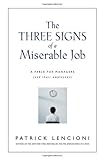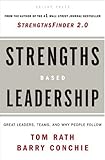Post 2 in the series The Three Signs of a Miserable Job
When we think of a “miserable job,” our tendency is to think of a job that involves tasks we don’t like very much. But that’s not what a miserable job is. Your job can involve activities that you actually enjoy very much — and yet it can be miserable.
That’s why it’s critical that we distinguish between a miserable job and a bad job. They are not the same. Lencioni rightly says:
As with beauty, the definition of a bad job lies in the eye of the beholder. [Note that: there are not necessarily any intrinsically “bad” jobs — it depends on your skills and preferences whether a job is a good or bad fit for you.] Some people consider a job bad because it is physically demanding or exhausting, involving long hours in the hot sun. Others see it as one that doesn’t pay well. Still others call a job bad because it requires a long commute or a great deal of time sitting behind a desk. It really depends on who you are and what you value and enjoy. (p. 217)
A miserable job, on the other hand is
the one you dread going to and can’t wait to leave. It’s the one that saps your energy even when you’re not busy. It’s the one that makes you go home at the end of the day with less enthusiasm and more cynicism than you had when you left in the morning. (p. 217)
A miserable job “has nothing to do with the actual work a job involves.” As a result, “miserable jobs are found everywhere — consulting firms, television stations, banks, schools, churches, software companies, professional football teams.” Further, they are also found at every level — “from the executive suite to the reception desk to the mail room.”
That’s important: Every type of job, at every level of an organization, can be a miserable job.
Hence, “a professional basketball player can be miserable in his job while the janitor cleaning the locker room behind him finds fulfillment in his work. A marketing executive can be miserable making a quarter of a million dollars a year while the waitress who servers her lunch derives meaning and satisfaction from her job.”
This is the intriguing thing about the miserable job. It saps your energy and enthusiasm and sometimes even zest for life. But it’s not because you don’t like the activities. It’s because of something else. Three things, actually. Before getting to those three things, however, we need to first discuss the consequences of a miserable job in the next post.
Posts in This Series
- The 3 Signs of a Miserable Job: An Introduction
- What is a Miserable Job?
- What are the Effects of a Miserable Job?
- What Makes a Job Miserable?
- What are the Benefits of Managing for Job Fulfillment?
- Addressing the First Sign: Anonymity
- Addressing the Second Sign: Irrelevance
- Addressing the Third Sign: Immeasurement

